
- Strongly Dem (41)
- Likely Dem (3)
- Barely Dem (2)
- Exactly tied (0)
- Barely GOP (2)
- Likely GOP (1)
- Strongly GOP (51)
- No Senate race
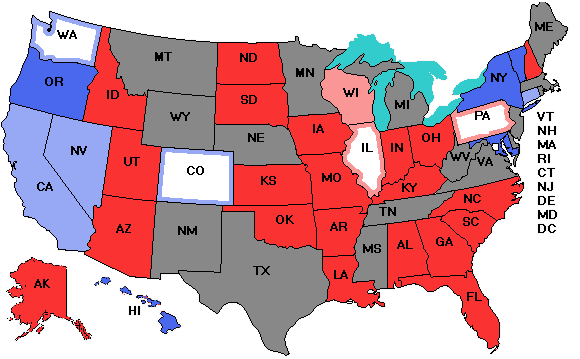
|
|
|
|
|
|
|
|
|
|
|
|
|
|
|
|
|
|
|
|
|
|
|
|
|
|
|
|
|
|
|
|
|
|
|
|
|
|
|
|
|
|
|
|
|
|
|
|
|
|
|
|
|
|
|
|
|
|
The current breakdown of the Senate is as follows:
- 10 Democratic seats up for reelection in 2016 and 36 seats not up, for a total of 46 seats
- 24 Republican seats up for reelection in 2016 and 30 seats not up, for a total of 54 seats
In a reversal from 2014, the Democrats will be playing offense, trying to pick up at least five seats (or four seats and the vice-presidency) in order to reclaim control of the Senate. As they do so, there are several pieces of good news for them:
- The party has had enormous success this year in recruiting top candidates, not only in states where the Democrats' chances are excellent, but also in states where their chances are only middling. By contrast, outside of Nevada, the Republicans have struck out with their preferred candidates.
- There is only one Democratic-held seat that is presently in play (Nevada), and one other that could conceivably join the list (Colorado). In contrast, as many as 16 Republican-held seats are or could be in play, with at least six of those being in significant danger (Wisconsin, Illinois, Pennsylvania, Florida, Ohio, and New Hampshire, in roughly that order).
- The Republicans are defending so many seats, and in so many expensive states, that they will almost certainly be compelled to do some triage after primary season and to declare some races to be lost causes.
- Presidential election years generally favor the Democrats, as they bring more voters to the polls, especially minorities, young people, and single women.
- Hillary Clinton, if she is indeed the Democratic nominee, may prove to have unusually large coattails. As a woman, she could attract female voters to the polls. As a former First Lady of Arkansas, she could impact Florida or Missouri or Arkansas in a way that John Kerry and Barack Obama could not.
The news is not all bad for the Republicans, however:
- The 2016 election is not a total mirror image of 2014. In that election, the Democrats' "in play" seats were in very red states like Alaska and Montana. This year, the Republicans' "in play" seats are largely in purple or light blue states like Ohio, New Hampshire, Florida, and North Carolina. In other words, the Republicans have an easier position to defend in 2016 than the Democrats did in 2014.
- The tea party's influence appears to be waning, in part due to changes in the economic climate, and in part due to a series of embarrassing electoral defeats. Compared to 2012 and 2014, it is much less likely (albeit not impossible) that the Republicans will blow a competitive race by nominating someone like Christine O'Donnell, Todd Akin, or Sharron Angle.
- North Dakota's Class 1 Senate Seat, held by Democrat Heidi Heitkamp, is not among the seats up for election this year and so is not technically in play. However, it could become so, should Heitkamp run for governor and win. See below for more.
- Even if they lose control of the Senate next year, the 2018 map will once again favor the Republicans, as the Democrats will be defending 23 seats in a nonpresidential year, including those in the red (or reddish) states of Indiana, Missouri, Montana, North Dakota and West Virginia. Should they wish to secure control of the Senate until the next presidential election, the Democrats will likely need a net gain of eight or nine seats this year—a very tall order.
The Democratic-held seats are listed first below, in alphabetical order by state, with the Republican ones following.
Click on a picture for the candidate's webpage.
Click on a name for the candidate's entry in Wikipedia.
Click on a party (D) or (R) for the state party.
The  symbol indicates a race to watch.
symbol indicates a race to watch.
All links open in a new window. Type CTRL-W in the window to close it (Command-W on a Mac).
Democratic-held seats
California
| Challenger | Challenger | Notes Polls |
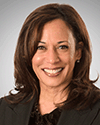
Kamala Harris (D) |

Loretta Sanchez (D) |
Barbara Boxer is retiring, and it's a two-woman race to be the Democrat that succeeds her. California Attorney General Kamala Harris is the first person of African or Asian descent to occupy that office (her father was Jamaican and her mother was Indian). She thus has ties to two constituencies that play an important role in California politics (7% of the population and 13%, respectively). Harris is also well connected to power brokers within the Democratic Party, who see her as a rising star and a possible presidential candidate in 2020 or 2024. She will undoubtedly get Boxer's endorsement, as both women hail from Northern California and from the liberal wing of the party. That said, Harris' campaign has struggled thus far—raising a lot of money, but also spending it inefficiently. She has already fired one campaign manager and two finance managers. The alternative is nine-term representative Loretta Sanchez, who presents a fairly striking contrast to Harris. Coming from a conservative district in Southern California, Sanchez is a leading Blue Dog (conservative) Democrat with strong ties to the Latino community. As 40% of California is Latino, and two-thirds of the state's population lives in the south, the demographics may favor Sanchez. Another pair of Democrats and a half-dozen Republicans have declared their candidacies for this seat, but they are likely not factors. California's jungle primary system means that Sanchez and Harris will probably face one another in June and then again in November, despite being from the same party. |
Colorado 
| Incumbent | Challenger | Notes Polls |

Michael Bennet (D) |

Candidate Unknown (R) |
Support for Michael Bennet is tepid in Colorado, and given that the state is purplish with a strong libertarian bent, Republicans see this as their second-best opportunity (behind Nevada) to take a Democratic-held seat in 2016. That assessment may be technically accurate, but "second-best chance" does not necessarily mean "good chance." To start, Bennet is the former head of the Democratic Senatorial Campaign Committee (DSCC) and a prodigious fundraiser—he has raised more money this year than all but four of his Senate colleagues. Further, the Republicans are having difficulty finding a top-flight candidate to oppose him. They had hoped to recruit Representative Mike Coffman, or—failing that—his wife, Colorado Attorney General Cynthia Coffman. However, Cynthia and several other prominent officials got caught trying to blackmail state party chair Steve House into resigning by threatening to reveal details of an alleged extramarital affair. The FBI is now investigating "Coffmangate," and criminal charges are likely. Cynthia's political career is over, and her husband—though apparently not involved with the blackmail scheme—has decided against a Senate run. Arapahoe County District Attorney George Brauchler declined to run, as well. Now, the GOP is hoping that State Rep. Jon Keyser, a decorated Air Force veteran, will run. He said a decision would be made over the holidays, but it hasn't come yet, and time is running short. |
Connecticut
| Incumbent | Challenger | Notes Polls |

Richard Blumenthal (D) |

Candidate Unknown (R) |
Richard Blumenthal kept his head down and his nose clean during his first six years in the Senate and now wants a second term, which he will get. A very blue state, Connecticut has no statewide officeholders who are Republican and has not sent a Republican to the U.S. Senate since the 1980s. Wrestling magnate Linda McMahon was the GOP candidate for the last two elections; this time, the party may not even bother to run someone unless they can get another freebie (i.e., a candidate who can completely self fund and not cost the party anything). Economist/pundit Larry Kudlow is talking about running, but that may just be talk, and in any case he would be no real threat to Blumenthal. |
Hawaii
| Incumbent | Challenger | Notes Polls |
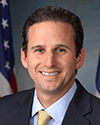
Brian Schatz (D) |

Candidate Unknown (R) |
Hawaii is the bluest state in the Union. When Brian Schatz ran in the 2014 special election to succeed deceased Senator Daniel Inouye, he beat his Republican opponent by 40 points (President Obama did even better in 2012, winning the state by 46). Hawaii has not given its electoral votes to the GOP since the Reagan landslide of 1984, and has elected a Republican to the U.S. Senate only once (Hiram Fong, who served from 1959 to 1976). The only possible threat to Schatz, then, would have to come in the primaries. Former Representative Colleen Hanabusa was Inouye's preferred successor, lost the 2014 primary to Schatz by less than 2,000 votes (out of 230,000), and is considering a second run. If she jumps in, Schatz will sweat a little, but he would still be the clear favorite. Ethnic politics is important in Hawaii (Schatz is Jewish and Hanabusa is Japanese-American) but not definitive. Whatever happens, this will be a Democratic seat when the 115th Congress convenes in 2017. |
Maryland
| Challenger | Challenger | Notes Polls |

Candidate Unknown (D) |

Candidate Unknown (R) |
Popular senator Barbara Mikulski is retiring after five terms. While Marylanders sometimes elect Republicans to statewide office (e.g., Gov. Larry Hogan in 2014), they turn deep blue when voting for senators. Mikulski won by 25 points in 2010, and her junior counterpart Benjamin Cardin won by 30 in 2012. The drama, then, will be in the Democratic primary. Maryland has a deep bench of top-tier Democratic candidates, two of whom are already declared, with others possibly to follow. The first to enter the race was seven-term representative Chris Van Hollen. Born in Pakistan to an officer of the U.S. Foreign Service, he has won much praise for his expertise in foreign affairs and in budgetary matters. Opposing Van Hollen is four-term representative Donna Edwards, a former community activist and lawyer with strong ties to the state's black community. Thus far, Van Hollen—former Chairman of the Democratic Congressional Campaign Committee (DCCC)—has raised $5 million to Edwards' $1.5 million, but the campaign is young and is still taking shape. Among the half-dozen or so prominent Maryland Democrats who may still throw their hats into the ring, the likeliest possibilities are Rep. John Delaney, a wealthy businessman who could self-fund a campaign, and Rep. Elijah Cummings, who is also black and who represents the critically important city of Baltimore. No serious Republican candidate has declared, as yet, and it is possible that none will. |
Nevada 
| Challenger | Challenger | Notes Polls |

Catherine Cortez Masto (D) |
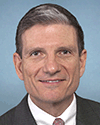
Joe Heck (R) |
Senate Minority Leader Harry Reid is retiring after five terms—perhaps because of age, perhaps because of a recent injury that left him blind in one eye, perhaps because he is tired of tough reelection campaigns. The most likely explanation, however, is that he beat nondescript, gaffe-prone tea partier Sharron Angle by only 6 points in 2010 and might well lose to a more serious candidate in 2016. Whatever the case may be, Reid will yield the Democratic mantle to his handpicked successor, Catherine Cortez Masto, who served eight years as Attorney General of Nevada before being term limited. If elected, she would be the first Latina to serve in the U.S. Senate (though she could end up sharing that honor with Loretta Sanchez). Enjoying wide name recognition across the state, Masto will have the considerable financial and logistical resources of Reid's political network at her disposal. The Republican candidate will almost certainly be two-term representative Joe Heck, who surprised and delighted the party establishment when he decided to run. A physician and brigadier general in the U.S. Army Reserve, Heck is an excellent campaigner and fundraiser who gives the Republicans far and away their best chance to capture a Democratic-held Senate seat in 2016. He will consistently remind voters that he has Washington experience and Masto does not (although, given how unpopular "Washington" is, maybe Masto will be the one doing the reminding.) Heck may have to fend off a challenge from Angle, who has hinted she may return for another go-round. He should be able to do so, though it could damage him a bit. This looks to be a very close race, and millions of dollars will pour in from outside of Nevada. The deciding factor could well be how many of the state's 780,000 Latinos go to the polling place on Election Day. |
New York
| Incumbent | Challenger | Notes Polls |

Chuck Schumer (D) |

Candidate Unknown (R) |
New York is a very blue state and Chuck Schumer is popular, has $22 million in the bank, and knows how to make use of the advantages of incumbency. He is also an aggressive self-promoter. As Bob Dole once observed, "The most dangerous place in Washington is between Chuck Schumer and a camera." (This infinitely recyclable joke was originally told about Theodore Roosevelt more than a century ago). Schumer won his last election by 33 points, and the one before that by nearly 50. The state is large enough that the Republicans will eventually come up with a respectable candidate—Reps. Chris Gibson, Peter King, and Tom Reed are all possible sacrificial lambs—but there's nothing to see here. Once he wins his fourth term, Schumer will likely take over for Harry Reid as leader of the Senate Democrats. |
Oregon
| Incumbent | Challenger | Notes Polls |
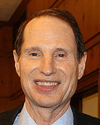
Ron Wyden (D) |

Candidate Unknown (R) |
A cancer scare had Ron Wyden considering retirement, but he's healthy now and gunning for a fifth term. He is one of the most liberal members of the U.S. Senate, and that suits deep-blue Oregon just fine; voters have bestowed an average margin of victory of 30 points upon him in his three previous reelection campaigns. Meanwhile, there is no Republican bench in the state. The only member of the GOP currently representing Oregon at either the state or federal levels is Rep. Greg Walden, and he is content to keep his very safe seat in the House. Whatever candidate the party fields will be a political unknown, just like Wyden's last two opponents. This is one of the Democrats' easiest holds. |
Vermont
| Incumbent | Challenger | Notes Polls |

Patrick Leahy (D) |

Candidate Unknown (R) |
Patrick Leahy is, interestingly, the only Democrat ever elected to the U.S. Senate from the state of Vermont. That unexpected quirk is a byproduct of his extremely long term of service, coupled with the fact that his junior colleague Bernie Sanders is so far left that he identifies as a Democratic Socialist. When Leahy began his career in the 1970s, Vermont was reddish-purple, and he had to contend with difficult campaigns and close elections. However, he has not had to break a sweat since the last time both a Clinton and a Bush were candidates for president—1992—when he won by "only" 10 points. Vermont was in the process of turning very blue then, and Leahy has won every election since by at least 35 points. Now the Dean of the Senate, he will easily win an eighth term, putting him within striking distance of Robert Byrd's record nine terms and 51 years in the Senate. |
Washington
| Incumbent | Challenger | Notes Polls |

Patty Murray (D) |

Candidate Unknown (R) |
Patty Murray was nearly toppled by the Republican wave in 2010, winning her fourth term by less than 4 points. Her position is stronger now; she played a leading role in averting a government shutdown in 2013, and this year she has raised an impressive $3.9 million for her campaign. The Republicans have a number of palatable options, including Reps. Jaime Herrera Beutler, Cathy McMorris Rodgers, and Dave Reichert, as well as former Washington Attorney General Rob McKenna. None has declared as yet, however, and early polls suggest that Murray would begin with a 5 to 15 point advantage over any of them. She is very likely to be elected to a fifth term. |
Republican-held seats
Alabama
| Incumbent | Challenger | Notes Polls |

Richard Shelby (R) |

Candidate Unknown (D) |
The last time Alabama sent a Democrat to the U.S. Senate was in 1994, when they elected...Richard Shelby. Then a Dixiecrat who was finishing his first term, he promptly changed parties after the election and became part of the "Contract with America" Republican wave. In the two decades since, Alabama has gone from being light red (+6 for Bush in 1992 and for Dole in 1996) to deep red (+22 for Romney), and Shelby has consistently won by a 2-to-1 margin when up for reelection. In short, no Democrat stands a chance against him in 2016. Indeed, when Alabama's other senator—Jeff Sessions—ran for reelection two years ago, the Democrats did not field a candidate (the first time that has happened in the state since the Civil War). This means that the only threat to Shelby—a social conservative and economic moderate who sponsors few bills and generally does what the Republican leadership tells him to do—would have to come from the right. In 2014, the tea party nearly unseated Senator Thad Cochran in the demographically similar neighboring state of Mississippi. Shelby's massive $19.5 million war chest should protect against that possibility (Cochran, by contrast, had about $2 million at this point in the cycle). Whatever happens, this seat is going to remain in Republican hands. |
Alaska 
| Incumbent | Challenger | Notes Polls |

Lisa Murkowski (R) |

Candidate Unknown (D) |
During her first full term in the Senate, Lisa Murkowski was a reliable "Main Street" (moderate) Republican. Her reward for this, when she ran for reelection in 2010, was to be primaried by tea partier Joe Miller. Murkowski countered by running as an independent, becoming only the second person to win a regular U.S. Senate election as a write-in candidate (the first was Strom Thurmond, and he did it with a name that is much easier to spell). In her second term, Murkowski has moved in a centrist direction, presumably an acknowledgment that the far right of the political spectrum is a lost cause for her. She is presently the most popular politician in Alaska (sorry, Sarah Palin!), is the only declared candidate in the race, and has nearly $3 million on hand—a veritable fortune in Alaska, where men are men and advertising is cheap. But while it is good to be a popular, well-heeled incumbent in a state dominated by your party, Murkowski has reason to be nervous. Her favorability ratings among Alaska Republicans are poor, and another tea party challenge is likely, with Joe Miller possibly returning for another turn. Should the tea party claim the nomination again, Murkowski would again run as an independent. In 2010, this worked for her—in large part—because the Democratic candidate (Scott McAdams) was a political novice and an unknown. This being the case, many Democrats either stayed home or decided they were better off giving their vote to Murkowski so as to counter Miller. If this year's Democrat is much stronger—Mark Begich, who lost his U.S. Senate seat in 2014, is the obvious possibility—that could very well change the equation. |
Arizona 
| Incumbent | Challenger | Notes Polls |
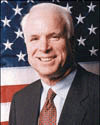
John McCain (R) |
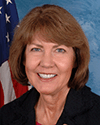
Ann Kirkpatrick (D) |
As he tries for a sixth term, John McCain has the advantages of near-universal name recognition, $5 million in the bank with a prodigious ability to raise more, and status as a war hero for everyone except Donald Trump. In solidly red Arizona, his margin of victory in his five previous Senate contests has never been less than 24 points. However, he is facing a formidable opponent in popular Democratic representative Ann Kirkpatrick, with early polls putting McCain up by only 6-7 points. Kirkpatrick's entry into the race came as a surprise; she is gambling that a challenge from the right is coming, and that it will seriously weaken McCain. On the first point, Kirkpatrick is probably correct. The Senator has moved rightward in the last few years, but his occasional willingness to work with Democrats and his association with various bipartisan measures (i.e. McCain-Feingold) have infuriated many Arizona Republicans. In 2014, the state party took the unusual step of censuring McCain, and a sizable majority of Republican voters disapprove of the job he is doing. The real question, then, is how much damage the tea party challenge will inflict. Reps. Matt Salmon and David Schweikert would both give McCain fits, but both have said they are disinclined to run. The only currently declared tea partier is State Senator Kelli Ward, who has limited resources and a propensity for putting her foot in her mouth. McCain would be delighted if she is the best the far right has to offer. The other wild card in the race is health: The Senator will be 80 on election day, has a lengthy history of nagging health problems, and has publicly acknowledged that he's running out of steam. Even a moderate health-related incident could persuade him to throw in the towel. For now, the seat appears to be safely Republican, but that could change. |
Arkansas 
| Incumbent | Challenger | Notes Polls |
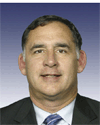
John Boozman (R) |

Conner Eldridge (D) |
John Boozman won his first Senate contest by 21 points, one of the many Republican successes in the 2010 midterm elections. As time passes, however, this victory is seeming more and more like it came despite Boozman, rather than because of him. He has proven to be a poor fundraiser and an unpopular senator, with a mediocre 34% approval rating. He has also had health problems, including emergency bypass surgery in 2014. These things being the case, it would not be a major surprise if Boozman reversed course and decided not to run for reelection. If he does remain a candidate, he will be more vulnerable than most Southern Republicans. The Democratic establishment tried to recruit a strong opponent, such as former governor Mike Beebe, but ultimately ended up settling on federal prosecutor Conner Eldridge. Eldridge will have an uphill battle, but he's not a sitting duck. He can run a law and order campaign, and he may benefit from Hillary Clinton's coattails and from Bill Clinton campaigning in the state. Bet on Boozman, if you must, but don't bet much. |
Florida 
| Challenger | Challenger | Notes Polls |

Candidate Unknown (R) |

Candidate Unknown (D) |
As we learned in 2000, Florida is a large state with many different constituencies, and fairly evenly divided between Republicans and Democrats. These facts, coupled with the retirement of Marco Rubio so that he can run for president, leave the stage set for a battle royale that will be the most expensive Senate race in U.S. history. On the Democratic side, Reps. Patrick Murphy and Alan Grayson will square off. Murphy is a moderate (and a former Republican) and is viewed as more electable, so he has the backing of the DSCC. Grayson is an outspoken liberal who tends to do impolitic things like compare the tea party to the Ku Klux Klan. One of the wealthiest members of Congress, he is able to compensate for a lack of establishment funds by taking out his checkbook. However, his campaign is in disarray, and he's also facing an ethics probe. So, bet on Murphy. On the Republican side, Lt. Gov. Carlos Lopez-Cantera and Rep. David Jolly will both try to court the moderate vote. If they split it, it could allow Rep. Ron DeSantis, a tea party favorite, to claim the Republican nomination. Pollsters who have looked at the various permutations give the slight edge to the Democrats, though the most common response given by respondents was, "Who?" Name recognition is an issue, then, but it won't be once the deluge of TV, radio, Internet, and print ads is underway. After the primaries are held in March, a favorite might emerge, but for now the race is a tossup. |
Georgia
| Incumbent | Challenger | Notes Polls |

Johnny Isakson (R) |

Candidate Unknown (D) |
Johnny Isakson is very popular in Georgia, having won his first two Senate races by 18 and 19 points, respectively. He loves Jesus and hates taxes, gay marriage, abortion, and ObamaCare, so he's not vulnerable to a tea party challenge. In June, he revealed that he has been diagnosed with Parkinson's disease, but thus far the news has not affected his reelection plans nor has it caused a viable candidate to Isakson's left—whether Democrat or moderate Republican—to present themselves. This seat is not in play now, nor is it likely to be on Election Day. |
Idaho
| Incumbent | Challenger | Notes Polls |

Mike Crapo (R) |

Candidate Unknown (D) |
Mike Crapo was bracing for a possible primary challenge from Rep. Raul Labrador, but Labrador decided to remain in the House. Meanwhile, the Democratic Party of Idaho is like the Loch Ness monster—rumored to exist, but actual evidence is scarce. They have not managed to get a senator elected since the 1970s, and that streak will continue in 2016. The only question is whether Crapo will improve upon the 71% of the vote he received in 2010. |
Illinois 
| Incumbent | Challenger | Notes Polls |

Mark Kirk (R) |

Tammy Duckworth (D) |
Mark Kirk was a very moderate representative, and for the past six years he's been a very moderate senator. Unfortunately for him, "moderate Republican" was barely viable in the Republican wave of 2010 (Kirk won his seat by less than 2 points), and in presidential years Illinois turns very blue. The Senator's tendency to put his foot in his mouth is not helpful, either. Just this year, he has had to apologize for characterizing bachelor Sen. Lindsey Graham (R-SC) as "a bro without hos," for describing black communities as "the one(s) we drive faster through," and for accusing President Obama of trying to "get nukes to Iran." If these liabilities were not enough, Kirk also suffered a serious stroke in early 2012, which was followed by a long and arduous recovery. He is already running a commercial, entitled "Courage," that tries to curry favor by linking his military service and his fight to overcome this disability. That commercial would be much more helpful if his likely opponent was not Tammy Duckworth, who lost both legs while serving as a helicopter pilot during the Iraq War. A charismatic two-term representative, Duckworth is the first disabled woman ever elected to the House, and the first Asian American to be elected to Congress from Illinois (she's Thai). However, she too has some political liabilities to contend with. She has no statewide experience, is presently the defendant in a lawsuit from her time as Director of the Illinois Department of Veterans Affairs, and she may not appeal to black voters (a critical Democratic constituency in Illinois). She is also facing a primary challenge from Chicago Urban League President and CEO Andrea Zopp, who most certainly will appeal to black voters. Nonetheless, the polls peg Duckworth as the likely nominee and winner, and the Democratic Party will pull out all the stops to see that happens, as they are already counting this seat as a +1 in their column. |
Indiana
| Challenger | Challenger | Notes Polls |

Candidate Unknown (R) |
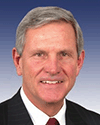
Baron Hill (D) |
Indiana is a fairly red state, but the retirement of Sen. Dan Coats has put this seat into play. The Republican bench is deep, and it looks to be a three-way race on that side of the aisle. Eric Holcomb is as establishment as it gets, having served as an aide to former governor Mitch Daniels, as chief-of-staff for Coats, and as Chairman of the Indiana Republican Party. Three-term representative Todd Young is a Naval Academy graduate and former marine. He is the best campaigner and fundraiser of the three Republican hopefuls and also has the most policy expertise and highest name recognition. Four-term representative Marlin Stutzman is the tea party candidate, and has gotten attention for his efforts to defund Obamacare and for his belief that we should not fight global warming if it means raising taxes. The Democratic bench is shallow, but the party was able to coax former five-term representative Baron Hill to run (while also persuading most of the less electable aspirants not to challenge him, though Hammond Mayor Thomas McDermott, Jr. may still enter the race). He is a solid campaigner, but his vote in favor of ObamaCare was so unpopular in Indiana that it compelled him to hire bodyguards and ultimately cost him his seat (to Todd Young). If Hill is to win, he will either need Stutzman to claim the Republican nomination and then turn into the second coming of Richard "Rapes are part of God's plan" Mourdock, or he will need Hillary Clinton to make winning Indiana a point of emphasis (when Barack Obama did so in 2008, he was able to take the state by one point). Either of these scenarios is well within the realm of possibility, but in their absence, Hill will likely lose and the seat will go to whichever of the three Republicans survives the primary. |
Iowa
| Incumbent | Challenger | Notes Polls |
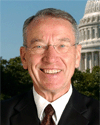
Chuck Grassley (R) |

Candidate Unknown (D) |
Chuck Grassley will be 83 on Election Day, and briefly considered retirement before committing to run for his seventh term. He is very popular in Iowa, thanks in particular to his success in bringing home the pork (in a state that loves pigs), and to his custom of holding a public meeting with constituents in each of Iowa's 99 counties every year. Though the state has been trending blue, particularly in presidential years, Grassley is impervious to such forces. In 1992, for example, Bill Clinton won Iowa by 5 points and Grassley still beat his Democratic opponent by 42. There appears to be no challenge coming from the right in 2016, and thus far the only Democrats to enter the race are a trio of current (Rob Hogg) or former (Tom Fiegen, Bob Krause) state legislators; polls have Grassley beating all three by 20 to 22 points. Unless a more viable Democrat unexpectedly enters the race—say, former governor Tom Vilsack—then Grassley will win this one in a walk. |
Kansas
| Incumbent | Challenger | Notes Polls |
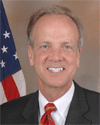
Jerry Moran (R) |

Candidate Unknown (D) |
Kansas was staunchly Republican when the GOP was the more liberal party, and remained so as it became the more conservative party. The last time the state's voters sent a Democrat to the U.S. Senate, they also gave their electoral votes to an upstart governor from New York who promised a "New Deal" for Americans. In other words, Jerry Moran does not need to be worried about the Democrats, and as a proud member of the Tea Party Caucus, his right flank is also safe. A more-moderate-but-not-TOO-moderate opponent might enter the Republican primary—President Obama's second cousin Milton R. Wolf is a possibility—but this would only be a "challenge" in the academic sense of the word. Now that he is the incumbent, this senate seat is Moran's for as long as he wants it. |
Kentucky
| Incumbent | Challenger | Notes Polls |

Rand Paul (R) |

Candidate Unknown (D) |
Kentucky has a reputation for being a solidly red state, but that's largely at the federal level. In state elections, Kentuckians often lean fairly Democratic (though that did not hold true in 2015). Depending on how one reads the tea leaves, Rand Paul—who is only moderately popular—is potentially vulnerable to a serious Democratic challenge. None has presented themselves as yet, but the Democratic bench is far from empty, with Kentucky Secretary of State (and 2014 Senate candidate) Alison Lundergan Grimes and Speaker of the Kentucky House of Representatives Greg Stumbo among the potential top-flight candidates. Beyond the identity of the Democratic challenger, there are two other major wild cards in this contest. The first of these is Paul's presidential campaign. Kentucky law forbids a candidate from appearing twice on the same ballot, and while some recent procedural maneuvering will keep this from being an issue in the primaries, Paul would be forced to withdraw from the Senate race if he was the Republicans' presidential candidate (virtually impossible) or vice-presidential candidate (very unlikely). The second wild card is an ongoing scandal involving illegal payoffs made by Ron Paul's campaign to Iowa State Senator Kent Sorenson in exchange for his endorsement in 2012. Rand has not been implicated in the scheme, but it still has the potential to attach to him, or at very least to undermine the political network he depends upon. This seat is currently safe for the Republicans, but with a high degree of volatility. |
Louisiana 
| Incumbent | Challenger | Notes Polls |

Candidate Unknown (R) |

Candidate Unknown (D) |
This race is currently up in the air. After being defeated in Lousiana's gubernatorial election, incumbent Sen. David Vitter announced his retirement. Now we wait to see how the Louisiana political establishment will respond to the news, though most of the state's heavy hitters—among them outgoing governor Bobby Jindal and former representative Jeff Landry (both Republicans), and New Orleans mayor Mitch Landrieu (a Democrat)—are reportedly considering bids. Jindal is wildly unpopular, Landry was just elected Lieutenant Governor, and Louisiana is still quite red, however, so all three would have serious cause for thinking twice about a run. Broadly speaking, the retirement of the badly-damaged Vitter probably helps the GOP, though that could change depending on whom the candidates are. |
Missouri 
| Incumbent | Challenger | Notes Polls |

Roy Blunt (R) |

Jason Kander (D) |
Roy Blunt is an incumbent, represents a solidly red state, and—though a moderate—is unlikely to face a tea party challenge thanks to the Todd Akin "legitimate rape" fiasco in 2014. That is the end of the good news for the Senator, however. His approval ratings are among the worst in Congress, with considerably more than half of Missourians unhappy with the job he is doing. Further, the Democrats have recruited a very strong candidate in Missouri Secretary of State Jason Kander, a charismatic military veteran who is currently (at 34) the youngest statewide elected official in America (and the only one born in the 1980s). Polls currently give Blunt just a five point lead and—of far greater concern for the GOP—reveal that only one in three Missouri voters feels they know enough about Kander to form an opinion of him. His support has room to grow, then, while Blunt's largely does not. Additionally, if the Missouri governor's race is as close as expected, it could bring a higher than average number of Democrats to the polls. So too could having a candidate whose husband used to govern next-door neighbor Arkansas at the top of the ballot (In both 1992 and 1996, Bill Clinton won Missouri, making him the last Democrat to do so). Blunt is still a slight favorite, but this seat is an excellent pickup opportunity for the Democrats. |
New Hampshire 
| Incumbent | Challenger | Notes Polls |

Kelly Ayotte (R) |

Maggie Hassan (D) |
New Hampshire is becoming bluer by the year, and though Kelly Ayotte is fairly moderate and fairly popular, the trend may catch up with her eventually. Will that be in 2016? The answer is in the hands of the state's most popular Democrat, Gov. Maggie Hassan, who decided to forego a third term as governor to mount a challenge. This compelled Ayotte to pivot toward the center, criticizing Sen. Ted Cruz (R-TX) as extremist, and also praising President Obama's climate change accord. Those statements angered many New Hampshire Republicans, and while a challenge from the right is unlikely, some of those voters may stay home on election day. That said, the race is a dead heat at the moment, and it may well remain that way to the bitter end. |
North Carolina 
| Incumbent | Challenger | Notes Polls |

Richard Burr (R) |

Candidate Unknown (D) |
As Richard Burr tries for a third term in this purple state, his mediocre approval ratings (around 35%) have Democrats sensing an excellent pickup opportunity. However, party officials got their biggest disappointment of the 2016 campaign (so far) when former senator Kay Hagan declined to enter the race. Her decision is not terribly surprising, given the challenges of running for a Senate seat in North Carolina. To start, the state's numerous large and distinct media markets make statewide elections very expensive. Indeed, Hagan's loss to Thom Tills in 2014 was the most costly U.S. Senate contest ever, with a total of $111 million expended. In addition to the stresses of constant fundraising, it is also the case that North Carolinians like to change senators as regularly as some people change socks. In most states, after a difficult first election, a sitting senator has a huge advantage in any subsequent contest and can coast a little bit (or, sometimes, a lot). Not in North Carolina, where 13 of the last 14 Senate races have been decided by single digits, and where each of the nine senators elected between Jesse Helms in 1972 and Burr in 2004 survived for only a single term (or less). Burr is being challenged from the right by physician Greg Brannon, businessman Larry Holmquist, and former judge Paul Wright, but none of the three has gained any traction. The Democrats in the race—businessman Kevin Griffin, Spring Lake Mayor Chris Rey, and former State Rep. Deborah Ross—are unknowns, though the state Democratic party is resigned to the idea that Ross will be the candidate, since the state's filing deadline has passed. |
North Dakota 
| Incumbent | Challenger | Notes Polls |

John Hoeven (R) |

Candidate Unknown (D) |
John Hoeven may be the most popular politician in North Dakota, having served 10 years as governor prior to his first term in the Senate. In Washington, he compiled a voting record designed to keep constituents happy—anti-ObamaCare, anti-immigration, pro-life, pro-Keystone pipeline. North Dakota voters are not entirely averse to voting for Democrats—including their other senator, Heidi Heitkamp—but overall the state is very red. Further, the Democratic bench there is paper-thin. The Hoevens rent an apartment while in Washington; they can feel free to renew their lease for another six years. There is also a possibility that the Republicans, at least those in Washington, will get even more good news from North Dakota. Gov. Jack Dalrymple is retiring, and if Heitkamp decides to run in the election to replace him and wins, she would be compelled to resign her Senate seat in December 2016. State law dictates that a special election be held within 95 days to fill such a vacancy; the Republicans would have a commanding upper hand in that hypothetical election. In this scenario, the Senate would convene with 99 members in January of 2017, and if the chamber was stalemated (with one party holding 50 seats, and the other holding 49 plus the vice presidency), that North Dakota seat would have enormous importance. |
Ohio 
| Incumbent | Challenger | Notes Polls |
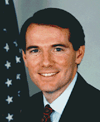
Rob Portman (R) |

Candidate Unknown (D) |
If you look up 'bellwether' in the dictionary, you will find a picture of Ohio. The last time the state failed to give its electoral votes to the winning presidential candidate was 1960, and in the half-century since, Ohioans have split their electoral and Senate votes only twice (John Glenn/Ronald Reagan in 1980 and Howard Metzenbaum/George H. W. Bush in 1988). In short, no Senate race is more likely to be affected by the presidential contest than this one—both parties will have their get-out-the-vote operations working at full capacity, and the one that is most successful may well decide whom Ohio sends to the Senate. During his first term, Rob Portman did his best to improve his reelection odds: He traveled to more than 30 countries in order to develop a reputation as a foreign policy specialist, strengthened his ties to the establishment by serving as chair of the National Republican Senatorial Committee (NRSC), and banked a staggering $10 million in campaign funds. However, his approval ratings are anemic. The Democrats' strongest candidate is former governor Ted Strickland, whom early polls give a 3 to 10 point lead over Portman. The Governor has some challenges, however—his fundraising has gotten off to a poor start (about $1.7 million so far), and he is likely to face a stiff primary challenge from the center-left in the form of popular Cincinnati Councilman P.G. Sittenfeld. This will be one of the most closely watched races in the country, and the outcome will likely be in doubt until the very end. |
Oklahoma
| Incumbent | Challenger | Notes Polls |
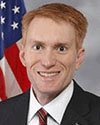
James Lankford (R) |

Candidate Unknown (D) |
If the Democrats win this seat, then get your affairs in order, for the end of days is nigh. Oklahoma is probably the reddest state in the nation, the only one in which Barack Obama never won a single county. James Lankford is a good match for his constituents, an arch-conservative who laments not only ObamaCare but also Medicare, who would like to shut down the EPA, and who wants to dramatically expand the Patriot Act. After winning the 2014 special election to finish Sen. Tom Coburn's unexpired term, Lankford wants a full term in his own right. He'll get it, possibly without opposition in either the primaries or the general election. |
Pennsylvania 
| Incumbent | Challenger | Notes Polls |

Pat Toomey (R) |

Candidate Unknown (D) |
Although Pennsylvania is the state that gave us Rick Santorum, it is actually fairly blue, and becomes bluer in presidential years. During his first term, Pat Toomey has been something of a mirror image of Santorum—fiscally conservative, but socially moderate. He barely eked out a victory over Joe Sestak in the Republican wave year of 2010, and so he has reason to be nervous heading into 2016. That said, Toomey will benefit from his low-key, non-confrontational nature—which Pennsylvanians like in their politicians—as well as from the civil war taking place on the Democratic side of the contest. There, former representative Joe Sestak—a retired three-star admiral and the highest-ranking military officer ever to serve in Congress—is back for another go-round. His story is compelling and his charisma is undeniable, but the Democratic establishment loathes him. He is a maverick in every sense of the word, and while a little rebelliousness can be a good thing at times, it is neither politic nor wise to wholly reject the assistance of the professionals during campaign season. Most of Sestak's campaign staff in 2010 was drawn from his immediate family, and a great many analysts—both inside the party and out—believe that cost him the election. The establishment's candidate is Katie McGinty, a former environmentalist with strong ties to the Clintons and to power brokers in Pennsylvania, but zero experience in elective office and low name recognition despite her unsuccesful run for governor in 2014. She would be Pennsylvania's first female senator, and the Democrats hope that a Hillary Clinton-Katie McGinty ticket would attract a lot of women voters. The Democratic primary is on April 26 of next year. Until then, this race will be nearly impossible to project, though it is worth noting that polls currently give Toomey a comfortable lead over either of his hypothetical opponents. |
South Carolina
| Incumbent | Challenger | Notes Polls |
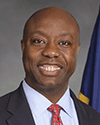
Tim Scott (R) |

Candidate Unknown (D) |
South Carolinians like their Senators ultra-conservative and Tim Scott, who was appointed (and then elected) to finish Jim DeMint's unexpired term, fits the bill. A devout evangelical Christian, Scott strongly opposes Iran, abortion, ObamaCare, labor unions, and earmarks for 49 of the 50 states (the $300 million for dredging Charleston's harbor, he argued, was about job creation and not pork). The only prominent Democrat in the state (other than 92-year-old former senator Ernest Hollings) is Rep. James Clyburn, and—being 75 years old—he is not going to give up the seat he has held for two decades in order to be a sacrificial lamb. This one is about as safe as it gets for the GOP. |
South Dakota
| Incumbent | Challenger | Notes Polls |

John Thune (R) |

Candidate Unknown (D) |
The state that was home to liberal three-term Democratic senator and presidential candidate George McGovern, as well as more recent three-term Democratic senators Tom Daschle and Tim Johnson, is now deep red. So much so, in fact, that John Thune ran unopposed in 2010. The Democrats have a few respectable candidates who might consider mounting a campaign this time—most notably four-term former representative Stephanie Herseth Sandlin—but if South Dakota is actually in play, it will mean that Republicans have much bigger things to worry about than this Senate seat. |
Utah
| Incumbent | Challenger | Notes Polls |

Mike Lee (R) |

Candidate Unknown (D) |
Mike Lee is not facing a primary challenge and currently his only Democratic opponent is Jonathan Swinton, a political novice. So, his path to a second term appears to be clear. Things would get considerably more interesting, however, if the Democrats persuaded seven-term former representative Jim Matheson to enter the race (he is considering the possibility, while also weighing a run for governor). Matheson is very conservative for a Democrat, and during his decade-plus in Congress had the distinction of representing the most Republican-leaning district among members of his party (R+30, on average). He would start the race as an underdog, but only a slight one, with polls giving Lee just a five- or six-point lead in a hypothetical matchup. If Matheson stays out of the race, then the seat most certainly stays Republican. |
Wisconsin 
| Incumbent | Challenger | Notes Polls |

Ron Johnson (R) |

Russ Feingold (D) |
Ron Johnson won a close election over Russ Feingold in 2010 (51% to 47%) and then served a fairly lackluster first term. He has particularly been hurt by his highly publicized confrontation with Hillary Clinton during the Congressional hearings on Benghazi, and also by his propensity to shoot from the hip. Among other impolitic moments, he has suggested that those who take out student loans are lazy, those who utilize ObamaCare are moochers, and has referred to Americans who are Muslim as "those people." Johnson's opponent is Feingold, who will attempt to become only the second senator in history to reclaim his seat in a rematch (the first was Peter Gerry of Rhode Island, who lost his reelection bid in 1928 but came back to defeat GOP senator Felix Hebert in 1934). Feingold has has some pretty serious baggage of his own, however. Having made a name as a campaign finance reformer, he declined most outside funds in 2010. Though perhaps a sincere gesture, this crippled his campaign and contributed substantially to his defeat. Now, Feingold will accept that money, which will be helpful on a practical level but will also open him up to charges of hypocrisy. In addition, after leaving office, the PAC that Feingold founded—Progressives United—appears to have spent considerably more money on Feingold's salary and on buying copies of his book to give out as "gifts" rather than actually lobbying for progressive causes. Given all the ammunition being provided by the candidates, along with the fact that Wisconsin is unusually polarized for a purple state, this will be an ugly campaign. The mudslinging has already started, in fact—the Republicans are lambasting "Radical Russ Feingold" on their state party website, while the Democrats are pointing out on their site that one of "Out of touch" Ron Johnson's donors is a white supremacist slumlord. Polls currently put Feingold up anywhere from 3 to 15 points, and the Democrats will do everything they can to keep it that way, as this state is essential to their chances of taking the Senate back. |
